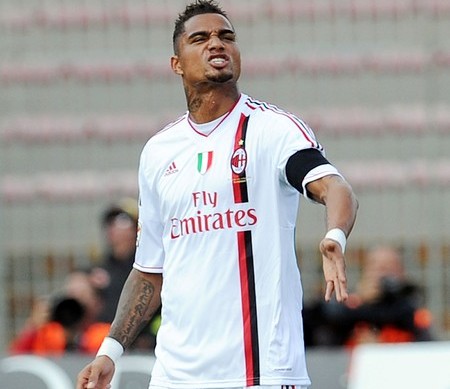Ghana midfielder Kevin-Prince Boateng has turned from hero to a villain after his very strange decision to quit the national team.
The deafening boos and jeers have been heard from Half Assini to Aflao, Accra to Bolgatanga since the surprise decision was made public last month.
It seems to get worse after every round of explanation from the 24-year-old, who still insists that health reasons are to blame for his decision to quit the national team, 18 months after he defected to the African nation from Germany.
When the AC Milan man first spoke to the BBC in 2010, he seemed very happy about his impending journey with his father’s home country.
"Ghana is definitely my future, 100 per cent. I want to play for the Black Stars," he said.
His subsequent performance at the World Cup belied his age and many saw him as the natural replacement for the world-class Michael Essien in the central midfield position.
A careful look at the different squads Ghana sent to the 2006 and 2010 World Cups will easily reveal that Boateng was one of the major forces behind the success story of the Black Stars in South Africa.
Athletically and physically gifted, Boateng provided a great presence in the key central midfield position, coupling his pace to the mercurial talents of Anthony Annan.
Boateng is the sort of player who is not afraid to get stuck in, and is a tough tackler.
He provided a great deal of bite within the Ghanaian midfield, and was important in breaking down opposition attacks while launching their own attacking movements.
In his role as either the second striker or an offensive midfielder, Boateng is the type of player who makes late runs into the 18-yard area with his power and pace, and can score the odd goal.
His strike against the USA at the World Cup was exceptional, running from the halfway line before unleashing the low shot which opened things up for the Black Stars.
His most important quality, however, is his winning mentality.
He is a born winner and will give his all on the field to succeed, even playing through the pain barrier if required.
The best demonstration of this quality was when Boateng recently came off the bench for Milan, helping them to turn a 3-0 deficit into a 4-3 comeback victory with a 14-minute hat-trick in a league game on October 23.
A player of this quality certainly brings a great deal to the table for a side, particularly in an era when Ghana are chasing their first trophy in 30 years.
Sadly, Boateng's attitude after the World Cup has provided much discomfort for the Stars' technical team, particularly for Serbian coach Goran Stevanovic, who was not impressed with the midfielder's attitude.
The new development brought back memories of Boateng’s wild past, when the Germany Under-21 coach Dieter Eilts reportedly dropped him because of 'negative incidents' that happened in the team's camp during the June 2007 Toulon Tournament, according to Berliner Morgenpost.
The full picture was, however, yet to emerge.
The height of this was when the Rossoneri midfielder reported that he was injured ahead of the Africa Cup of Nations qualifier against the Congo, but then made a surprise visit to the Ghana camp in London on the eve of the historic friendly game with England in May 2011.
Boateng appeared to be sending out a clear message to the country's FA: he will play for the Black Stars on his own terms. But the organisation and its president, Kwesi Nyantakyi, were not in the mood to tolerate dissent from any player.
The former Hertha Berlin midfielder's old demons had apparently returned, and Nyantakyi attempted to bring the situation to a positive conclusion when he paid a visit to the out-of-favour player in October.
That exercise was one in futility because Boateng announced his decision to quit the national team soon after, due to what he called 'health reasons'.
To add insult to injury, Boateng recently told Vanity Fair: "My knee has suffered six injuries and six surgeries. It gives me pain on flights due to pressure changes, so I have to say goodbye to Ghana because I am keen on my health."
Looking back on how the issue has unfolded over the past months, it may be about time that stopped belittling the intelligence of Ghanaians.
His talent may be beyond question, but he cannot take the fans for a ride, thinking that he could still have a place in the team after the 2012 Africa Cup of Nations in Equatorial Guinea and Gabon, when perhaps it will suit him to return.
Source: Goal.com

